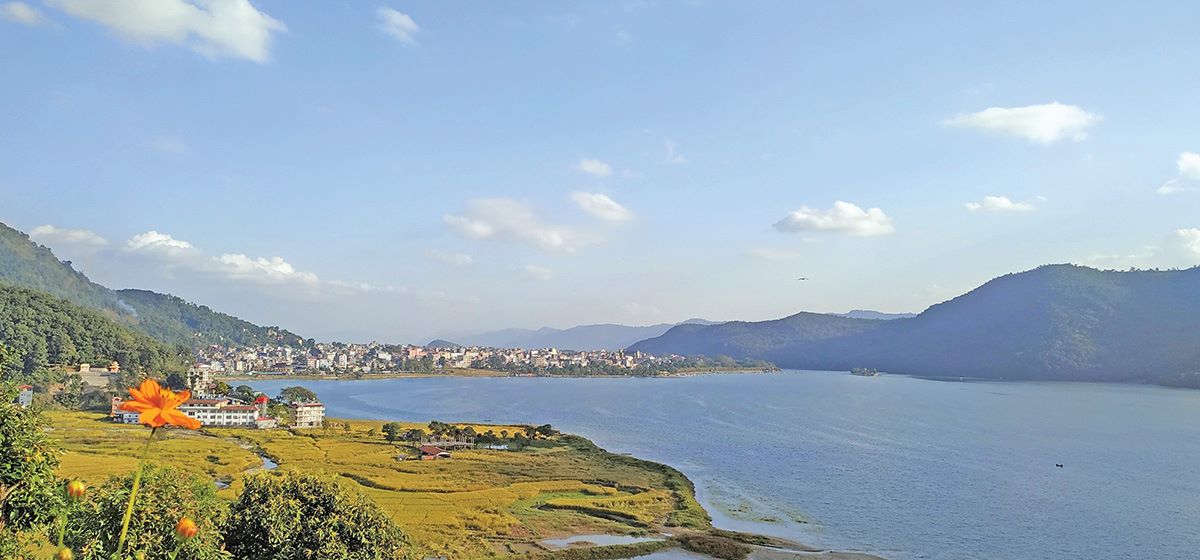
Kathmandu, Sept 29: The Supreme Court (SC) has issued a mandamus for a second time, instructing the government to remove all illegal physical structures within 65 meters from the banks of Phewa Lake within the next six months. The SC order aims to demolish buildings constructed on public land surrounding the lake.
Earlier, the Pokhara Metropolitan City had disregarded the SC’s previous decision and allocated an area of only 30 meters from the shores of Fewa Lake. In response, four individuals, including advocate Khagendra Subedi, filed a petition in the SC two years ago challenging this decision. The petition named the Office of the Prime Minister and Council of Ministers, the Office of the Chief Minister and Council of Ministers of the Gandaki Province government, and the District Land Revenue Office, Kaski, the defendants in the petition. The SC recently released the full text of its judgment on this writ from September 21.
The SC had previously issued a mandamus on April 29, 2018, to remove all structures built on unauthorized land within 65 meters from the shores of Phewa Lake. However, Pokhara Metropolitan City had set a standard of 30 meters instead of 65 meters from the lake’s shores.
The SC has now invalidated the decision taken by the 55th meeting of the Pokhara Metropolitan City Executive on March 30, 2022. The SC’s order states that “houses, buildings, businesses, hotels, restaurants, resorts, etc., located within the area up to 65 meters from the shores of Phewa Lake must be demolished.” The order further specifies that all personal, government, and public structures within the designated area must be removed or vacated within six months, with the objective of maintaining the designated 65-meter green buffer zone around Phewa Lake.
Given that Phewa Lake has been declared a protected water body, the SC has also ordered compliance with the Soil and Watershed Conservation Act, 2039, for its protection. The verdict emphasizes that there is no dispute regarding land compensation from 2018 BS to 2031 BS. Consequently, the land surrounding Phewa Lake is considered government property and will remain so according to Section 24 (2) of the Land Acquisition Act, 2034.
The SC has stated that the area within 65 meters of Phewa Lake represents the highest water level during the rainy season, and compensation should only be considered for land beyond this limit, in accordance with the law.
Additionally, the SC has directed the Directorate of Judgment Implementation to monitor the ongoing enforcement of its orders. The definition of government land under Section 2 (b) of the Land Acquisition Act 2034 includes lakes, ponds, and land owned by the government, which includes Phewa Lake.
The SC has asserted that local authorities do not have sole jurisdiction in this matter. While Section 11(1), (12) of the Local Government Operation Act, 2074, contains general provisions applicable to rural municipalities and municipalities nationwide, the SC has emphasized that the provisions outlined in the Town Development Act, 2045, are mandatory for urban development. Compliance with these conditions and standards for town area development and the protection of natural resources, environment, water, and forests is essential.
Furthermore, the SC has clarified that Phewa Lake falls within the jurisdiction of Pokhara Metropolitan City which cannot take unilateral decisions that contravene the provisions of the Town Development Act, 2045, a federal law governing urban development.
Historically, the surface area of Phewa Lake remained unchanged from 2018 BS to 2031 BS. However, in 2031 BS, the water level dropped due to dam damage. A survey conducted in 2032/33 BS revealed that some land along the shores of Phewa Lake had been registered in individuals’ names, allowing landowners to claim ownership rights. The dam’s construction began in 2034 BS and was completed in 2038 BS.
Subsequently, some areas that had been measured and registered in 2032 BS were submerged during a lake flood. The SC has determined that there is no dispute regarding compensation for the period from 2018 BS to 2031 BS, up until the dam’s collapse. Accordingly, the land around Phewa Lake should be considered as part of Phewa Lake based on this historical basis.
Comments